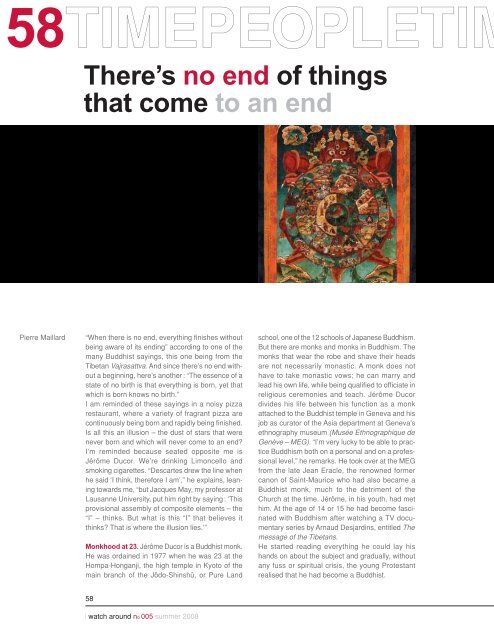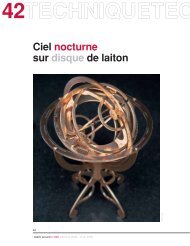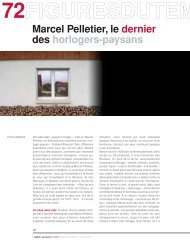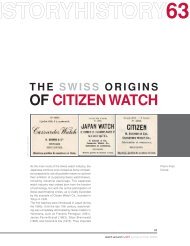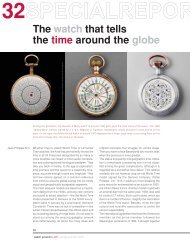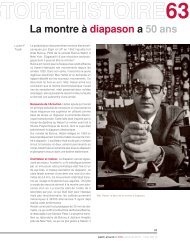You also want an ePaper? Increase the reach of your titles
YUMPU automatically turns print PDFs into web optimized ePapers that Google loves.
58TIMEPEOPLETIMThere’s no <strong>en</strong>d of thingsthat come to an <strong>en</strong>dPierre Maillard“Wh<strong>en</strong> there is no <strong>en</strong>d, everything finishes withoutbeing aware of its <strong>en</strong>ding” according to one of themany Buddhist sayings, this one being from theTibetan Vajrasattva. And since there’s no <strong>en</strong>d withouta beginning, here’s another: “The ess<strong>en</strong>ce of astate of no birth is that everything is born, yet thatwhich is born knows no birth.”I am reminded of these sayings in a noisy pizzarestaurant, where a variety of fragrant pizza arecontinuously being born and rapidly being finished.Is all this an illusion – the dust of stars that wer<strong>en</strong>ever born and which will never come to an <strong>en</strong>d?I’m reminded because seated opposite me isJérôme Ducor. We’re drinking Limoncello andsmoking cigarettes. “Descartes drew the line wh<strong>en</strong>he said ‘I think, therefore I am’,” he explains, leaningtowards me, “but Jacques May, my professor atLausanne University, put him right by saying: ‘Thisprovisional assembly of composite elem<strong>en</strong>ts – the“I” – thinks. But what is this “I” that believes itthinks? That is where the illusion lies.’”Monkhood at 23. Jérôme Ducor is a Buddhist monk.He was ordained in 1977 wh<strong>en</strong> he was 23 at theHompa-Honganji, the high temple in Kyoto of themain branch of the Jôdo-Shinshû, or Pure Landschool, one of the 12 schools of Japanese Buddhism.But there are monks and monks in Buddhism. Themonks that wear the robe and shave their headsare not necessarily monastic. A monk does nothave to take monastic vows; he can marry andlead his own life, while being qualified to officiate inreligious ceremonies and teach. Jérôme Ducordivides his life betwe<strong>en</strong> his function as a monkattached to the Buddhist temple in G<strong>en</strong>eva and hisjob as curator of the Asia departm<strong>en</strong>t at G<strong>en</strong>eva’sethnography museum (Musée Ethnographique deG<strong>en</strong>ève – MEG). “I’m very lucky to be able to practiceBuddhism both on a personal and on a professionallevel,” he remarks. He took over at the MEGfrom the late Jean Eracle, the r<strong>en</strong>owned formercanon of Saint-Maurice who had also became aBuddhist monk, much to the detrim<strong>en</strong>t of theChurch at the time. Jérôme, in his youth, had methim. At the age of 14 or 15 he had become fascinatedwith Buddhism after watching a TV docum<strong>en</strong>taryseries by Arnaud Desjardins, <strong>en</strong>titled Themessage of the Tibetans.He started reading everything he could lay hishands on about the subject and gradually, withoutany fuss or spiritual crisis, the young Protestantrealised that he had become a Buddhist.58| watch around no 005 summer 2008
EPEOPLETIMEPEOKarine BauzinThe V<strong>en</strong>erable Eracle th<strong>en</strong> <strong>en</strong>couraged him to learnhow to read classical Tibetan so that he couldbecome familiar with the source texts. Academicallyit was heavy going, but he persisted. This was followedby studies in Lausanne under Jacques Mayof the four historical scripts of Buddhism – Pali,Sanskrit, Tibetan and Chinese. Th<strong>en</strong> came adegree in religious studies and a PhD in Japanesestudies at the University of G<strong>en</strong>eva.There’s no such thing as original sin. Notwithstandinghis erudition, Jérôme Ducor, at the age of54, is a lively young man with a s<strong>en</strong>se of fun who likesto <strong>en</strong>joy the good things in life. But is this because ofhis g<strong>en</strong>tle Buddhism or because of his own character?“Unlike Catholicism, which is a faith, Buddhismis a personal habit, a method,” he explains. “InBuddhism, the concept of original sin does not exist.There is no s<strong>en</strong>se of guilt, rather a s<strong>en</strong>se of responsibility.People have oft<strong>en</strong> dismissed the notion ofkarma, reducing it to a type of fatalism, saying ‘soand-sohas bad karma.’ But it’s simply the natural lawof cause and effect. What I am today is the result ofwhat I used to be. And my exist<strong>en</strong>ce and actions willhave their effects on what follows. In other words, youonly have yourself to blame.”59watch around no 005 summer 2008 |
TIMEPEOPLETIMEcyclesof timeWhich leads us to the thorny question of cyclicaltime, the subject of our interview. I wanted to knowabout this idea of infinite phases of reincarnation thatseems so strange to the Western view of time as anarrow flying eternally through <strong>en</strong>dless space andsustained by faith. His first answer is as curator of hismuseum’s Asia departm<strong>en</strong>t. “The whole of Asia fromIndia to Borneo – and God knows how many differ<strong>en</strong>tpeoples and civilisations that includes – has anotion of cyclical time. That’s no doubt due to the vulnerabilityof their exist<strong>en</strong>ce, the immemorial awar<strong>en</strong>essof natural disasters – floods, earthquakes, tidalwaves.” You grasp the idea of imperman<strong>en</strong>ce, th<strong>en</strong>the monk speaks: “In Buddhism, this cyclical conceptapplies at every dim<strong>en</strong>sion: on a universal scalewhere everything is born, dies and is reborn; on ahuman scale or on a microscopic scale where everythingis similarly born, dies and is reborn ceaselessly.That could explain the frequ<strong>en</strong>tly noted clos<strong>en</strong>essbetwe<strong>en</strong> Buddhism and sci<strong>en</strong>ce. We’re not thesame, but we connect…”Buddhism and sci<strong>en</strong>ce. Einstein once remarkedthat if any religion could embrace the dictates ofmodern sci<strong>en</strong>ce, it would be Buddhism. ForBuddhists, there is no Creator, so the universecould not have be<strong>en</strong> created. It can only be an infinitesequ<strong>en</strong>ce of Big Bangs followed by BigCrunches without beginning or <strong>en</strong>d in a compreh<strong>en</strong>sivelycyclical universe with periods of billionsor millions of years, of decades or of millisecondsdep<strong>en</strong>ding on whether you’re referring to galaxies,mankind or sub-atomic particles. A far cry from thephilosophy of the dedicated Creationist.Similarly, Buddhism’s notion of imperman<strong>en</strong>ce concordswith the latest in sci<strong>en</strong>tific thinking. In cosmologyas in particle physics, everything is in a state offlux and if the stars can collapse into black holes, socan the fundam<strong>en</strong>tal building blocks of matter.Particles change their nature from photons to waves.“There is no single God, but a multitude of transitorydivinities; there is no single soul, but a multitude oftransitory souls; there is no single time, but a multitudeof transitory times,” recites Jérôme Ducor. “Fora Cartesian mind, the idea of reincarnation is nons<strong>en</strong>sical,because so long as you believe in a perman<strong>en</strong>t“I” you will be unable to grasp the idea that it is just anongoing remix of imperman<strong>en</strong>t elem<strong>en</strong>ts.”Enlight<strong>en</strong>m<strong>en</strong>t and the Big Bang. So does thisnotion of cyclical time self-destruct wh<strong>en</strong> onereaches <strong>en</strong>light<strong>en</strong>m<strong>en</strong>t, satori, illumination – call it60| watch around no 005 summer 2008
PEOPLETIMEPEOPwhat you will? Wh<strong>en</strong> Buddha becomes Buddha,doesn’t time cease its cycles to become perman<strong>en</strong>t?“Wh<strong>en</strong> Buddha becomes Buddha…” repeatsJérôme Ducor teasingly. “First of all, there is noneed for him to become anything. And secondly it isnot for an un<strong>en</strong>light<strong>en</strong>ed person to say anything onthis subject.” A physicist, unable to cross the thresholdof the Big Bang, would give the same answer.Beyond, laws as we know them no longer apply.This whimsical aspect of Buddhism, rare in religions,could be a sign of superior wisdom. Or takethe use of dark irony in the tantra translated by theJapanese writer, Yukio Mishima: “If you meet theBuddha, kill the Buddha! If you meet your ancestor,kill your ancestor! If you meet a disciple ofBuddha, kill the disciple of Buddha! If you meetyour mother and father, kill your mother and father!Only th<strong>en</strong> will you find release. Only th<strong>en</strong> will youelude the shackles of life, and you will be free…”Black humour? Rather the stroke of a Z<strong>en</strong> wandrevealing the imperman<strong>en</strong>ce of things in order toshatter our belief in perman<strong>en</strong>ce that sustains theillusion that time has no hold on us.And what hold does the <strong>en</strong>dless river of time, withits calms and storms, have on a Buddhist? Shouldhe learn to swim? “The practice of Buddhism – andI remind you that Buddhism only has a meaning orreligious significance as practice or a path to follow– results in a s<strong>en</strong>se of reality. The acceptance ofour exist<strong>en</strong>ce, the resulting peace of mind, and ours<strong>en</strong>se of being relative to all things are b<strong>en</strong>eficialoutcomes. But to take things as they come, as timebrings them along, doesn’t imply any kind of resignationto one’s fate. The Buddhist is no bleatinglamb either. But he puts no obligations on anyone,is fri<strong>en</strong>dly and demonstrates an amazing ability toadapt. And besides, there’s never be<strong>en</strong> such athing as a Buddhist crusade.The last customers have left. It’s getting late, timeresumes its cycle in the imperman<strong>en</strong>ce that surroundsus. It is time to take our leave of oneanother, but not without a thought of a small Z<strong>en</strong>koan: “How long does it take to experi<strong>en</strong>ce the joyof living for a mom<strong>en</strong>t of eternity? If you don’t livefor the mom<strong>en</strong>t, it will take an eternity.” •More about Buddhism on Jérôme Ducor’s site,www.pitaka.ch which has lots of links arrangedaccording to subject.61watch around no 005 summer 2008 |


